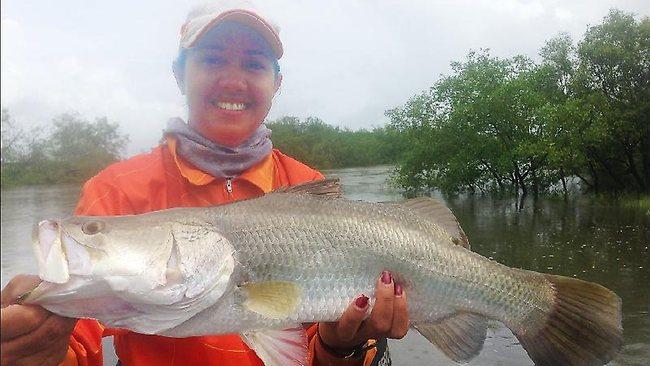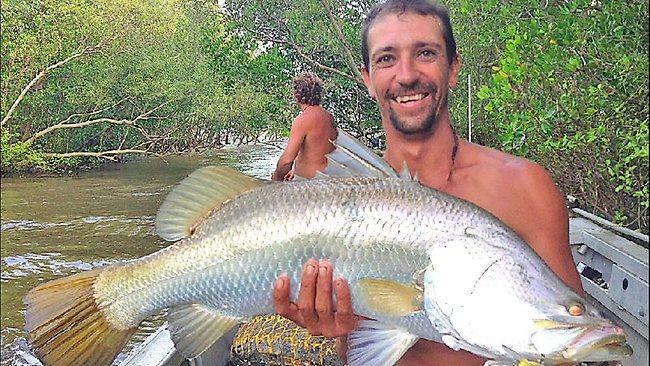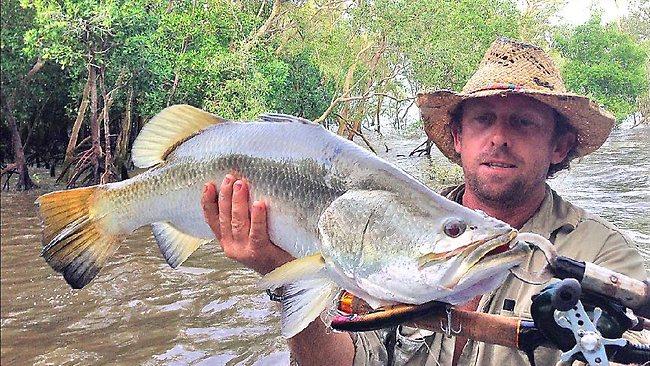Lured by bountiful barra
There's no doubt that the next few weeks will yield some amazing barra-fishing sessions for a multitude of anglers across the Top End's big rivers.

Fishing
Don't miss out on the headlines from Fishing. Followed categories will be added to My News.
IT'S so ironic that, while the rest of the Australian angling community is constantly battling ill-informed, fanging greenies and rabid, one-eyed animal liberationists, here in the Top End the promise of a great recreational barra fishing season is celebrated as headline news.
There's no doubt that the next few weeks in particular will yield some amazing barra-fishing sessions for a multitude of anglers across the Top End's big rivers.
It's a simple fact that, when you have a wet season that starts as early as this one has (late November) and then continues right through February and almost certainly into March, with one of the most widespread and intense monsoonal troughs dumping across the big-river floodplains, the inland aquatic food chain goes bananas.
We've already seen so much evidence of this on the swollen floodplains at the top half of the South Alligator River, where huge numbers of green, lagoon-escapee barra were gulping down tonnes of green frogs in a feeding frenzy of massive proportions.

So, once the flood waters start to recede in earnest, and the true run-off begins, all that delicious barra tucker will be pouring throughg feeder creeks into the main river channels, and barra will be lined up, ready to pounce.
Hundreds of thousands of anglers around the country know this; more than three decades of constant national print and electronic media coverage have made certain of that.
That's why there definitely will be a barra-fishing-led boon to Top End tourism this year, because so many interstate anglers will grab the opportunity to head up here and hopefully sample the great fishing that will be on offer.

An army of barra-feverish anglers will be doing it alone - towing or carrying boats behind late-model four-wheel-drives, or perhaps hiring boats for "the big trip".
Accommodations along the Daly River, at Mary River and on the Arnhem Highway are already getting inundated with inquiries and bookings.
Along the way and when they get here, they'll be spending on food, accommodation, fuel, beverages, maintenance, repairs and much more.
Then there'll be the fly-in quick trippers who will keep our many professional barra guides and fishing tour operators busy, as well as the resorts, hotels, lodges and van parks they stay in.
Make no mistake about it - word interstate of a wet season like this one will be worth tens of millions of dollars to the NT economy. And it won't be just for the run-off; fishing for the whole year will be better because of it.
Great wet seasons notwithstanding, we should never lose sight of the fact that the main reason we have such great barra fishing up here is because of all the good work that was done by the Amateur Fishermen's Association NT (AFANT) and others, together with governments that listened and were prepared to manage the barra stocks by buying back commercial licences and closing rivers to netting.

It didn't happen overnight; we're talking serious lobbying of successive governments that began with the birth of AFANT 34 years ago.
Back then, there were more than 120 commercial barra licences and now there are only 15, with plans to buy back more. Back then, the Daly, Mary, Adelaide, Roper, McArthur and Finniss rivers, plus the four rivers of Kakadu, and both Darwin Harbour and Shoal Bay, were all open to commercial netting.
Now they're all closed, primarily because of AFANT getting governments to realise the economic, social and sustainable value of our barra populations are all worth far more within the confines of recreational fishing than commercial harvest.
Aware of all this, why not come along to the AFANT AGM at 10am this Sunday at Tracy Village Social and Sports Club on Tambling Terrace, Lyons?
Access to waters covered by Blue Mud Bay, construction and funding of the Dundee Beach and Mary River boat ramps, removal of the Mary River barramundi seasonal closure, development pressures including new ports, mining, oil and gas, the push for major expansions of irrigation and the proposed changes to recreational fishing regulations for snapper and black jewfish are just some of the significant challenges for AFANT in protecting the quality of fishing in the NT in 2014.
AFANT president Warren de With said: "AFANT has been largely supportive of the Government's and NT Fisheries' proposed changes to address the sustainability issues with golden snapper and black jewfish.
"The recreational sector has accepted the changes on the basis that all sectors likewise make the necessary reductions in harvest.
"AFANT has expressed real concerns to Government about the continued push by the commercial fishing sector to target golden snapper in the areas around Darwin with new gear types, including fish traps and demersal trawl gear, and we will be seeking a commitment from the Government that all sectors are doing their bit and no new pressure will be put on the fish stocks.
"Recovery of the stocks can only occur if all sectors do their bit to protect the resource.
"The NT Government must address this unsustainable catch effort and targeting of golden snapper by other fisheries or gear types.
"We have reached a critical point in the Blue Mud Bay negotiations, with closed waters still affecting fishing access in the Tiwi Islands and the upper Finniss River and have had a number of agreements reached recently, with a few more apparently in the pipeline.
"We have asked the Minister for Fisheries, Willem Westra van Holthe, to give us a report at the AGM on the current agreements, proposed outcomes and how it will impact on our fishing access in the future.
"With the increased push for water extraction from the NT's important river systems and aquifers, and new proposals for large dams on the Adelaide, Elizabeth and Finniss river systems, AFANT wants to ensure that any increased development or water extractions are sustainable and will not have any tangible impact on the health of our river systems or the quality of our fishing in the NT."
At the meeting, Professor Michael Douglas will be presenting the latest science on the impact of water extraction on North Australian fisheries.
That should also be worth listening to, in what is surely the single most important event on the NT fishing calendar.
Territory anglers who are currently enjoying the enormous benefits of AFANT's great work over three-and-a-half decades, and those who have an interest in the future protection and development of our recreational fisheries, should really make the effort to attend.


